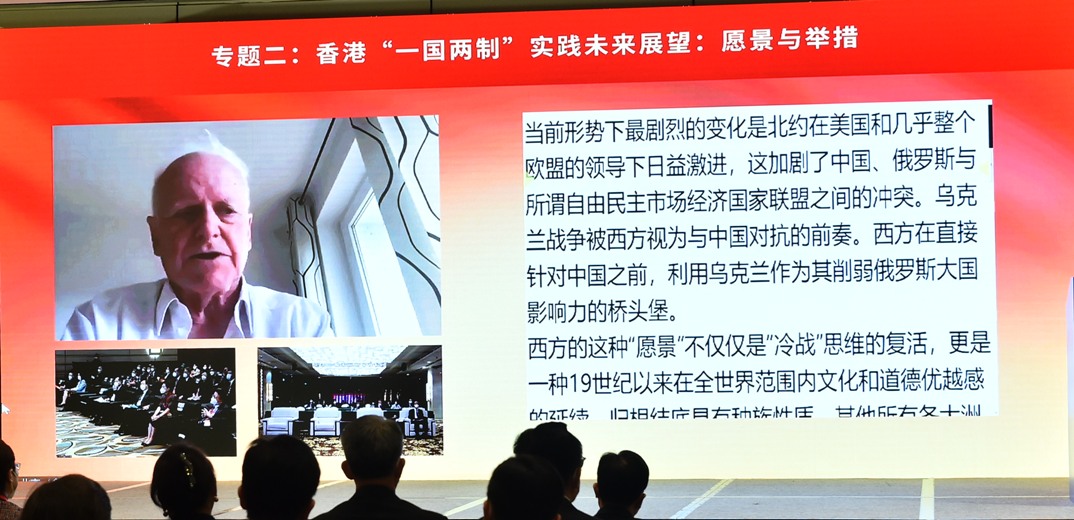
国际形势风云变化下“一国两制”和香港的未来发展——以习近平主席在香港回归25周年之际的重要讲话为视角
托尼·卡蒂
当前形势下最剧烈的变化是北约在美国和几乎整个欧盟的领导下日益激进,这加剧了中国、俄罗斯与所谓自由民主市场经济国家联盟之间的冲突。乌克兰战争被西方视为与中国对抗的前奏。西方在直接针对中国之前,利用乌克兰作为其削弱俄罗斯大国影响力的桥头堡。
西方的这种“愿景”不仅仅是“冷战”思维的复活,更是一种19世纪以来在全世界范围内文化和道德优越感的延续,归根结底具有种族性质。其他所有各大洲都普遍意识到这一点,这也是为什么如此多的国家对这场冲突保持不温不火的态度,并避免对俄罗斯实施制裁的原因。
此外,美国声称在全球尤其是在西太平洋地区所拥有的绝对优势地位,是通过“以规则为基础的国际秩序”的说辞包装出来的,而非基于像国际法或联合国宪章这样大家公认的法律概念,同时也不知不觉建立在对中国文化和道德(实际上是种族)的优越感之上。
这种西方优越感造成其对催生香港国安法和新选举制度的香港2019年危机的误读。西方依然对当年7月以来在香港发生的极端暴力抗议活动视而不见,也不承认这个城市的所谓泛民主运动已经落入了那些专注于让这座本已难以管治的城市彻底陷入混乱的人的手中。这也是为何西方会误读习近平主席所强调的香港的管治者必须是致力于香港(作为中国一部分)福祉的爱国者。在习近平主席的讲话中,他解释了如何通过修改完善选举制度来体现“爱国者治港”的原则。
西方看待香港政治发展的方式与其看待乌克兰的方式如出一辙。西方在情感上将乌克兰浪漫化,视其为与自己一样的所谓自由民主国家,与被“妖魔化”的俄罗斯形成鲜明对比。西方暗中将香港视为其自身受“压迫”的一部分。与此同时,习近平主席将国家主权和安全视为维护国家统一的最高原则。他明确指出新通过的香港国安法如何建立了维护该地区(香港)国家安全的法律体系(以反对2019年出现的分裂主义和恐怖主义)。
在这个更广阔的国际背景下,中国对香港“一国两制”一如既往的承诺在全球范围内代表着一个独特的机会(这个机会曾经也受到英国的欢迎),即通过将“自由主义”和“社会主义”融合在一个国家里来调和两个世界。事实上,新选举制度增加了40名由选举委员会根据德才提名的成员。这有可能对立法会中现存的功能团体议员和分区直选议员起到平衡作用,从而有效回应新任行政长官希望解决的许多迫切的民生问题。部分受制于立法会内的界别利益,也受制于泛民主派的意识形态动机,他的前任们在这方面遭遇种种障碍。对此,习近平主席在他的讲话中坚定提出,要“切实排解民生忧难……我说过,人民对美好生活的向往,就是我们的奋斗目标”。
香港仍然是东西方交汇点。然而,西方并没有意识到这座城市的亲西方元素受西方内部两极化元素的影响有多大,这些两极化元素使得美国、法国、英国(仅举几例)难以治理。西方现在是种族、性别、宗教、收入差距和移民等内部争执问题的受害者,这些问题使西方动荡不安,这种不安情绪蔓延到了香港。中国(最初也是英国)在香港的宪政实验形成了一种将直接民主和精英政治结合在一起、可以被称为混合型的政府。事实上,香港现在有机会展示,政府可以完全以人民的福祉和幸福为中心,政治生活不必像现在的乌克兰一样,将公共空间变成暴力的意识形态斗争,从而威胁到人类的未来。
The Future Development of One Country, Two Systems and
Hong Kong in the Background of Major Changes in the International Landscape and in the Context of President Xi’s Speech on the Occasion of the 25th Anniversary of the Return of Hong Kong to China
Anthony Carty
The most serious change in this landscape is the increasing aggressiveness of NATO, led by the US and also now virtually the whole of the EU, in sharpening the conflict between Russia and China on the one hand and the League of so-called liberal democratic market economy States on the other hand. The war in the Ukraine is seen by the West as a prelude to confrontation with China. The West instrumentalizes the Ukraine as a vanguard State in its campaign to eliminate Russia as a major power, before turning directly on China.
The Western ‘vision’ is not simply a resurrection of ‘cold war’ thinking, but a continuation of a 19th century sense of cultural and ethical superiority in the world, which may possibly be, in the final analysis, racial in character. This is largely recognized in all the other continents, which is why so many countries remain lukewarm to the conflict and refrain from sanctions against Russia.
Furthermore, the US claim to absolute preeminence in the world and particularly in the Western Pacific is dressed up in the rhetoric of a ‘rules based international order’ – not an agreed legal concept such as international law nor the UN Charter – while being unconsciously founded on the same sense of cultural and ethical superiority over China.
The same sense of Western superiority has determined the Western interpretation of the crisis in Hong Kong in 2019 which led to the new National Security Law and Electoral Law. The West remains blind to the extreme violence of the protests in Hong Kong as they developed since July of that year, and as well it fails to acknowledge how far the so-called pan democratic movement in the city had come into the hands of those focused on electing only those who would make an already ungovernable city descend into complete chaos. This is why the West misunderstands President Xi’s call that the politicians and administrators of Hong Kong must be patriots dedicated to the well-being of Hong Kong as part of one country – China. The President explains in his speech how the electoral system has been modified and improved ‘thereby materializing the principle that Hong Kong should be administered by patriots’.
The manner in which the West sees political developments in Hong Kong bears comparison also with its emotional romanticization of the Ukraine as a so-called liberal democracy like itself, in contrast to the ‘demonized’ Russia. Implicitly the West is treating Hong Kong as an oppressed part of itself. In contrast, President Xi treats national sovereignty and security as top priorities to maintain China as one country. He makes clear how the newly adopted National Security Law ‘has established the legal system to safeguard national security in the region’- (against the separatism and terrorism which showed themselves in 2019).
In this wider international context China’s continued commitment to Hong Kong’s ‘One country, two systems’ represents, on the global plane, a unique opportunity – once also welcomed by the United Kingdom – to reconcile two worlds by bringing ‘liberal’ and ‘socialist’ ideals together in one country. In fact, the new electoral law introduces an additional forty members nominated by representative panels on the basis of merit. This has the possibility to serve to balance out the existing functional constituencies and the directly elected members of Legco so as to make possible an effective response to the many pressing livelihood issues which the new Chief Executive wishes to address. His predecessors were blocked partially by sectional interests in Legco but also by the ideological drive of the pan democrats. Again, President Xi proposes firmly in his speech: Hong Kong should earnestly address people’s concerns and difficulties in daily life……As I once said, the people’s aspirations for a better life is what we are striving for.
Hong Kong is still very much a meeting point between East and West. Yet the West does not recognize how far the pro-Western elements of the City are affected by the polarizing elements within the West itself which are making such countries as the USA, France and Britain – to name only a few – ungovernable. The West is now prey to internal feuds over race, gender, religion, income disparity and immigration which have deeply unsettled it. Its unsettled mood has spread to Hong Kong. China – and originally also the UK’s - Hong Kong experiment in constitutionalism offers what may be called a hybrid or mixed form of government, combining direct democracy and meritocracy. In fact, Hong Kong now has the opportunity to show that government can be entirely about the welfare and happiness of its people, and political life does not have to turn the public space into violent ideological struggles which -as in the Ukraine at present – threaten the very future of humanity.